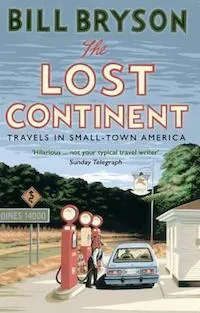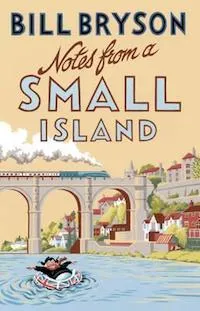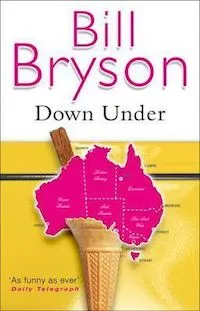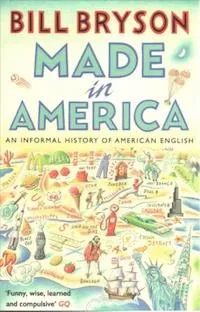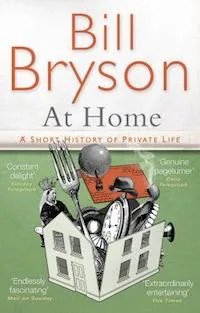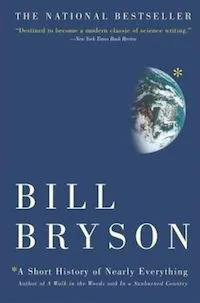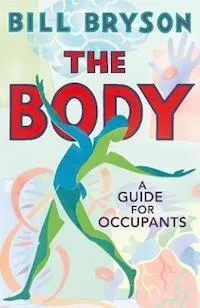
Reading Pathways: Bill Bryson
This content contains affiliate links. When you buy through these links, we may earn an affiliate commission.
Bill Bryson is an American-British writer who has authored twenty-some books. I first read his books in undergrad uni, as I was researching an essay for geography on travel literature. Travel lit was something I read a lot of back then, and Bryson quickly became a favourite. He is hilarious and his writing is marked with a wonderfully dry wit that I love.
Bryson’s books can be categorised into four broad categories: travel, history, language, and science. If you haven’t read any of his books and are looking for recommendations on which ones to read, this is my suggestion: all of them (a list of his books can be found here). If you are after a perhaps slightly more helpful suggestion, well…okay.
This is Bryson’s first book, about his travels around small town America as he searches for the America of his childhood. From the first chapter:
It was against this disturbed and erratic background that I became gripped with a curious urge to go back to the land of my youth and make what the blurb writers like to call a journey of discovery. On another continent, 4,000 miles away, I became quietly seized with that nostalgia that overcomes you when you have reached the middle of your life and your father has recently died and it dawns on you that when he went he took some of you with him. I wanted to go back to the magic places of my youth — to Mackinac Island, the Rocky Mountains, Gettysburg — and see if they were as good as I remembered them. I wanted to hear the long, low sound of a Rock Island locomotive calling across a still night and the clack of it receding into the distance. I wanted to see lightning bugs, and hear cicadas shrill, and be inescapably immersed in that hot, crazy-making August weather that makes your underwear scoot up every crack and fissure and cling to you like latex, and drives mild-mannered men to pull out handguns in bars and light up the night with gunfire. I wanted to look for Ne-Hi Pop and Burma Shave signs and go to a ball game and sit at a marble-topped soda-fountain and drive through the kind of small towns that Deanna Durbin and Mickey Rooney used to inhabit in the movies. I wanted to travel around. I wanted to see America. I wanted to come home.
Those last two sentences in the above quote really resonate with me and make me love this book. I am a geographer, and one of the things I love to do when travelling is to get away from the big cities and visit small towns. A country’s story is rarely entirely told by just its cities; there is life and history beyond the large population centres and I like to explore those as much as I like seeing the famous sights. I love going to small towns and seeing what lives that are different from mine are like. And this is a book that is essentially all about travels in small towns; it is a different America to the one I know now. I also especially empathise with the desire to go home. As an expat, I’ve come to realise that ‘home’ is a bit of a funny concept, ever-changing and not necessarily tied to a single place. Bryson’s journey in this book to find his childhood, and find home, is one I understand better now than when I first read the book over a decade ago.
Bryson had been living in Britain for over 20 years before moving back to the U.S. with his young family. He went on one final journey around Britain before his move back, and this book was the result (he has since travelled around the UK more; his 2015 travel book, The Road to Little Dribbling, is an account of his travels around Britain to see what has changed in the 20 years since Notes from a Small Island was published). It has been voted the book that best represents Britain. Bryson captures the eccentricities and quirks of the country beautifully, and the book is a wonderful, funny read. From the last chapter:
Suddenly, in the space of a moment, I realised what it was that I loved about Britain – which is to say, all of it. Every last bit of it, good and bad – Marmite, village fetes, country lanes, people saying ‘mustn’t grumble’ and ‘I’m terribly sorry but’, people apologising to me when I conk them with a nameless elbow, milk in bottles, beans on toast, haymaking in June, stinging nettles, seaside piers, Ordnance Survey maps, crumpets, hot-water bottles as a necessity, drizzly Sundays – every bit of it.
What a wondrous place this was – crazy as fuck, of course, but adorable to the tiniest degree. What other country, after all, could possibly have come up with place names like Tooting Bec and Farleigh Wallop, or a game like cricket that goes on for three days and never seems to start? Who else would think it not the least odd to make their judges wear little mops on their heads, compel the Speaker of the House of Commons to sit on something called the Woolsack, or take pride in a military hero whose dying wish was to be kissed by a fellow named Hardy? (‘Please Hardy, full on the lips, with just a bit of tongue.’) What other nation in the world could possibly have given us William Shakespeare, pork pies, Christopher Wren, Windsor Great Park, the Open University, Gardners’ Question Time and the chocolate digestive biscuit? None, of course.
How easily we lose sight of all this. What an enigma Britain will seem to historians when they look back on the second half of the twentieth century. Here is a country that fought and won a noble war, dismantled a mighty empire in a generally benign and enlightened way, created a far-seeing welfare state – in short, did nearly everything right – and then spent the rest of the century looking on itself as a chronic failure. The fact is that this is still the best place in the world for most things – to post a letter, go for a walk, watch television, buy a book, venture out for a drink, go to a museum, use the bank, get lost, seek help, or stand on a hillside and take in a view.
All of this came to me in the space of a lingering moment. I’ve said it before and I’ll say it again. I like it here. I like it more than I can tell you.
I’m a little biased, being Australian myself, but this is one of my favourite Bryson travel books. He spends time in the outback, in the cities, in small country towns. The book is full of interesting historical facts and anecdotes, and Bryson’s wry observations of my home country made me even more aware of our various cultural quirks. This is how the book begins:
Flying into Australia, I realised with a sigh that I had forgotten again who their Prime Minister is. I am forever doing this with the Australian PM – committing the name to memory, forgetting it (generally more or less instantly), then feeling terribly guilty. My thinking is that there ought to be one person outside Australia who knows.
But then Australia is such a difficult country to keep track of. On my first visit, some years ago, I passed the time on the long flight from London reading a history of Australian politics in the twentieth century, wherein I encountered the startling fact that in 1967 the Prime Minister, Harold Holt, was strolling along a beach in Victoria when he plunged into the surf and vanished. No trace of the poor man was ever seen again. This seemed doubly astounding to me – first that Australia could just lose a Prime Minister (I mean, come on) and second that news of this had never reached me.
And so, he spends time travelling around Australia, getting to know the country, and the result is one of the most charmingly funny books I’ve read about the place.
This is a book about the English language and popular culture in America, and in exploring how certain aspects of language and culture in America came to be, he inevitably enlightens readers about the history of the country as well. I feel like I learnt more about America from this book than I did from the official guide for the American citizenship test.
At Home is a brilliant and illuminating book about private life and domesticity. Bryson takes readers on a journey through the history of the rooms in his home, an 1851 Norfolk refectory. He pays close attention to the ordinary things in life, examining how the events of roughly the past 150 years have shaped private life as we know it now. This book is full of interesting facts and anecdotes, and I have a personal bias and fondness towards the period that the book focuses on: the 19th century, when the modern public library was born.
This is an absolute triumph of a book. It’s Bryson’s first non-travel book, and is a remarkable work of narrative nonfiction. It is, as the title suggests, a short history of nearly everything. More specifically, it is a history of our universe and how it came to be. It is a bestselling popular science book that explains many scientific concepts to a general audience. Like his other non-travel books, this is full of facts, trivia, interesting characters, and funny anecdotes. For someone who hated science in school, this is a book that makes science interesting. It covers areas such as astronomy, geology, physics, and chemistry, among others. Above all, it is a book about how shockingly amazing it is that we are here at all, as he notes in the introduction:
Not only have you been lucky enough to be attached since time immemorial to a favoured evolutionary line, but you have also been been extremely — make that miraculously — fortunate in your personal ancestry. Consider the fact that for 3.8 billion years, a period of time older than the Earth’s mountains and rivers and oceans, every one of your forebears on both sides has been attractive enough to find a mate, healthy enough to reproduce, and sufficiently blessed by fate and circumstances to live long enough to do so. Not one of your pertinent ancestors was squashed, devoured, drowned, starved, stranded, stuck fast, untimely wounded, or otherwise deflected from its life’s quest of delivering a tiny charge of genetic material to the right partner at the right moment in order to perpetuate the only possible sequence of hereditary combinations that could result — eventually, astoundingly, and all too briefly — in you.
This is Bryson’s first book since The Road to Little Dribbling (2015), and it is another wonderful work of science writing. He leads readers on a journey through the human body and how it works, leaving them with a greater understanding of the body and life itself. He covers areas of anatomy, physiology, biochemistry, disease, and medicine, all with his trademark wit and humour. A truly delightful book and one of my favourite books of 2019. This is a book that should be on holiday gift lists for anyone with a passing interest in how the body works.
And there you have it. Out of all of the many and wonderful books Bill Bryson has written, these are the seven I think readers who are new to Bill Bryson should start with. Other books I wanted to include on this list are A Walk in the Woods and Notes from a Big Country, but really my original point remains: which Bill Bryson books do I think you should read? All of them.
Travel
I still think of Bill Bryson as primarily a travel writer, despite almost half of his published works being of the non-travel variety (especially the more recent books). This is where it all began, and so this too is where I shall start this reading pathways. The Lost Continent (1989)
The Lost Continent (1989)
This is Bryson’s first book, about his travels around small town America as he searches for the America of his childhood. From the first chapter:
It was against this disturbed and erratic background that I became gripped with a curious urge to go back to the land of my youth and make what the blurb writers like to call a journey of discovery. On another continent, 4,000 miles away, I became quietly seized with that nostalgia that overcomes you when you have reached the middle of your life and your father has recently died and it dawns on you that when he went he took some of you with him. I wanted to go back to the magic places of my youth — to Mackinac Island, the Rocky Mountains, Gettysburg — and see if they were as good as I remembered them. I wanted to hear the long, low sound of a Rock Island locomotive calling across a still night and the clack of it receding into the distance. I wanted to see lightning bugs, and hear cicadas shrill, and be inescapably immersed in that hot, crazy-making August weather that makes your underwear scoot up every crack and fissure and cling to you like latex, and drives mild-mannered men to pull out handguns in bars and light up the night with gunfire. I wanted to look for Ne-Hi Pop and Burma Shave signs and go to a ball game and sit at a marble-topped soda-fountain and drive through the kind of small towns that Deanna Durbin and Mickey Rooney used to inhabit in the movies. I wanted to travel around. I wanted to see America. I wanted to come home.
Those last two sentences in the above quote really resonate with me and make me love this book. I am a geographer, and one of the things I love to do when travelling is to get away from the big cities and visit small towns. A country’s story is rarely entirely told by just its cities; there is life and history beyond the large population centres and I like to explore those as much as I like seeing the famous sights. I love going to small towns and seeing what lives that are different from mine are like. And this is a book that is essentially all about travels in small towns; it is a different America to the one I know now. I also especially empathise with the desire to go home. As an expat, I’ve come to realise that ‘home’ is a bit of a funny concept, ever-changing and not necessarily tied to a single place. Bryson’s journey in this book to find his childhood, and find home, is one I understand better now than when I first read the book over a decade ago.
 Notes From a Small Island (1995)
Notes From a Small Island (1995)
Bryson had been living in Britain for over 20 years before moving back to the U.S. with his young family. He went on one final journey around Britain before his move back, and this book was the result (he has since travelled around the UK more; his 2015 travel book, The Road to Little Dribbling, is an account of his travels around Britain to see what has changed in the 20 years since Notes from a Small Island was published). It has been voted the book that best represents Britain. Bryson captures the eccentricities and quirks of the country beautifully, and the book is a wonderful, funny read. From the last chapter:
Suddenly, in the space of a moment, I realised what it was that I loved about Britain – which is to say, all of it. Every last bit of it, good and bad – Marmite, village fetes, country lanes, people saying ‘mustn’t grumble’ and ‘I’m terribly sorry but’, people apologising to me when I conk them with a nameless elbow, milk in bottles, beans on toast, haymaking in June, stinging nettles, seaside piers, Ordnance Survey maps, crumpets, hot-water bottles as a necessity, drizzly Sundays – every bit of it.
What a wondrous place this was – crazy as fuck, of course, but adorable to the tiniest degree. What other country, after all, could possibly have come up with place names like Tooting Bec and Farleigh Wallop, or a game like cricket that goes on for three days and never seems to start? Who else would think it not the least odd to make their judges wear little mops on their heads, compel the Speaker of the House of Commons to sit on something called the Woolsack, or take pride in a military hero whose dying wish was to be kissed by a fellow named Hardy? (‘Please Hardy, full on the lips, with just a bit of tongue.’) What other nation in the world could possibly have given us William Shakespeare, pork pies, Christopher Wren, Windsor Great Park, the Open University, Gardners’ Question Time and the chocolate digestive biscuit? None, of course.
How easily we lose sight of all this. What an enigma Britain will seem to historians when they look back on the second half of the twentieth century. Here is a country that fought and won a noble war, dismantled a mighty empire in a generally benign and enlightened way, created a far-seeing welfare state – in short, did nearly everything right – and then spent the rest of the century looking on itself as a chronic failure. The fact is that this is still the best place in the world for most things – to post a letter, go for a walk, watch television, buy a book, venture out for a drink, go to a museum, use the bank, get lost, seek help, or stand on a hillside and take in a view.
All of this came to me in the space of a lingering moment. I’ve said it before and I’ll say it again. I like it here. I like it more than I can tell you.
 Down Under (2000)
Down Under (2000)
I’m a little biased, being Australian myself, but this is one of my favourite Bryson travel books. He spends time in the outback, in the cities, in small country towns. The book is full of interesting historical facts and anecdotes, and Bryson’s wry observations of my home country made me even more aware of our various cultural quirks. This is how the book begins:
Flying into Australia, I realised with a sigh that I had forgotten again who their Prime Minister is. I am forever doing this with the Australian PM – committing the name to memory, forgetting it (generally more or less instantly), then feeling terribly guilty. My thinking is that there ought to be one person outside Australia who knows.
But then Australia is such a difficult country to keep track of. On my first visit, some years ago, I passed the time on the long flight from London reading a history of Australian politics in the twentieth century, wherein I encountered the startling fact that in 1967 the Prime Minister, Harold Holt, was strolling along a beach in Victoria when he plunged into the surf and vanished. No trace of the poor man was ever seen again. This seemed doubly astounding to me – first that Australia could just lose a Prime Minister (I mean, come on) and second that news of this had never reached me.
And so, he spends time travelling around Australia, getting to know the country, and the result is one of the most charmingly funny books I’ve read about the place.
History/Language
There are a few books that could fall under this category, like his memoir, The Life and Times of Thunderbolt Kid, and his biography of Shakespeare. But there are two in particular I wish to highlight. Made in America (1994)
Made in America (1994)
This is a book about the English language and popular culture in America, and in exploring how certain aspects of language and culture in America came to be, he inevitably enlightens readers about the history of the country as well. I feel like I learnt more about America from this book than I did from the official guide for the American citizenship test.
 At Home (2010)
At Home (2010)
At Home is a brilliant and illuminating book about private life and domesticity. Bryson takes readers on a journey through the history of the rooms in his home, an 1851 Norfolk refectory. He pays close attention to the ordinary things in life, examining how the events of roughly the past 150 years have shaped private life as we know it now. This book is full of interesting facts and anecdotes, and I have a personal bias and fondness towards the period that the book focuses on: the 19th century, when the modern public library was born.
Science
 A Short History of Nearly Everything (2003)
A Short History of Nearly Everything (2003)
This is an absolute triumph of a book. It’s Bryson’s first non-travel book, and is a remarkable work of narrative nonfiction. It is, as the title suggests, a short history of nearly everything. More specifically, it is a history of our universe and how it came to be. It is a bestselling popular science book that explains many scientific concepts to a general audience. Like his other non-travel books, this is full of facts, trivia, interesting characters, and funny anecdotes. For someone who hated science in school, this is a book that makes science interesting. It covers areas such as astronomy, geology, physics, and chemistry, among others. Above all, it is a book about how shockingly amazing it is that we are here at all, as he notes in the introduction:
Not only have you been lucky enough to be attached since time immemorial to a favoured evolutionary line, but you have also been been extremely — make that miraculously — fortunate in your personal ancestry. Consider the fact that for 3.8 billion years, a period of time older than the Earth’s mountains and rivers and oceans, every one of your forebears on both sides has been attractive enough to find a mate, healthy enough to reproduce, and sufficiently blessed by fate and circumstances to live long enough to do so. Not one of your pertinent ancestors was squashed, devoured, drowned, starved, stranded, stuck fast, untimely wounded, or otherwise deflected from its life’s quest of delivering a tiny charge of genetic material to the right partner at the right moment in order to perpetuate the only possible sequence of hereditary combinations that could result — eventually, astoundingly, and all too briefly — in you.
 The Body (15 October 2019)
The Body (15 October 2019)
This is Bryson’s first book since The Road to Little Dribbling (2015), and it is another wonderful work of science writing. He leads readers on a journey through the human body and how it works, leaving them with a greater understanding of the body and life itself. He covers areas of anatomy, physiology, biochemistry, disease, and medicine, all with his trademark wit and humour. A truly delightful book and one of my favourite books of 2019. This is a book that should be on holiday gift lists for anyone with a passing interest in how the body works.
And there you have it. Out of all of the many and wonderful books Bill Bryson has written, these are the seven I think readers who are new to Bill Bryson should start with. Other books I wanted to include on this list are A Walk in the Woods and Notes from a Big Country, but really my original point remains: which Bill Bryson books do I think you should read? All of them.



